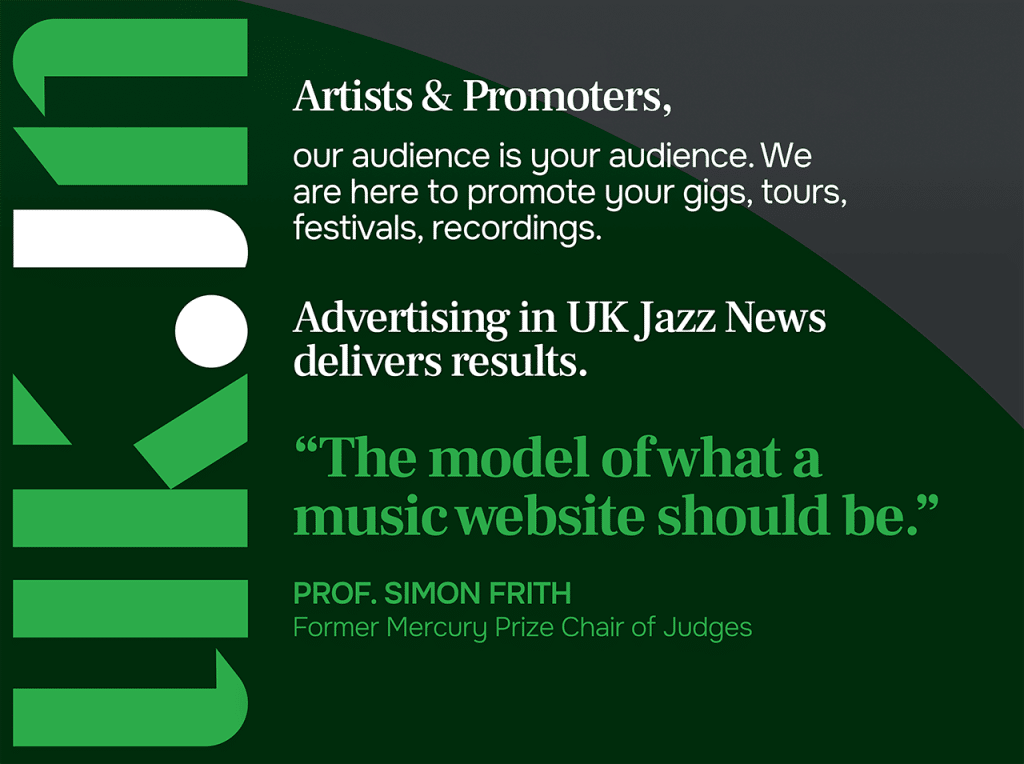Hudson Hall almost wasn’t here.
The arts organisation and venue is housed at the historic Hudson Opera House, constructed in 1855, initially as Hudson’s city hall. In 1975, the last cement plant shipped out of town and neglect staked its claim. As the late ‘70s bled into the early ‘80s, as structures were demolished left and right, the Opera House seemed downright moribund.
But then, a grassroots movement stepped in. For a quarter century, throughout the ‘90s and 2000s, the New York town’s citizenry gradually raised funds, and renovated the building one room at a time. In 2017 it could finally open, and the following year Hudson Jazz Fest took shape. It’s held fast every year since, even through the pandemic.
Its 2024 iteration, my first ever, was a welcome introduction.
Granted, only the fest’s headliners actually performed at Hudson Hall. On Friday 4 October, the vocalist Ekep Nkwelle graced its stage. On Saturday 5 October, trumpeter Riley Mulherkar performed, followed by pianist Ethan Iverson on the Sunday.
The rest of the weekend offered a chance to stretch out and experience the idiosyncratic town of some 5,000, just as the trees turned dazzling hues. Throughout the weekend, artists from nearby Bard College – faculty, current students, and alumni – laid down grooves in select enclaves, including breweries, galleries, and a tiny scrubby park between buildings.

The last time I saw Nkwelle, the swiftly rising Cameroonian American vocalist, she had won third at 2023’s Sarah Vaughan International Jazz Vocal Competition. There, the young singer interpreted Max Roach and Duke Ellington with authority.
What I didn’t know was that, the previous year, she’d actually gotten second, but felt her performance of “Never Will I Marry” was over-arranged. She also felt that it got a negative reaction, and was worthy of a second shot. “I strongly believe that I have something to say with that song,” she told UK Jazz News by phone after the festival. “I should have never let it go.”
During Nkwelle’s headlining performance, which paid tribute to her jazz gateway, Ella Fitzgerald, she took another swing at it, and connected. “I was marking the moments in [her] life,” Nwelle explained to me. “Marking key relationships in her life, and how they meet with composers and selections that I love.”
The set consisted of standards and originals by the First Lady of Song. I made it into Hudson Hall just as she reprised her arrangement of Ellington’s “Solitude,” with smoulder, snap and swing. Bobby Timmons’ “Moanin’” was heavily swinging, and a launchpad for potent vocalese.
“I know what y’all are thinking; when’s this child going to scat?” Nkwelle quipped to laughs from the skewing-older audience, before launching into “Smooth Sailing” and “Spring Can Really Hang You Up The Most.”
In the almost-year since the so-called SASSY Awards, her lower register has sharpened considerably, and she’s proving to be a formidable storyteller – which, in the teeming world of jazz singers, is arguably what separates the great from the good. “A-Tisket, A-Tasket” (as in, “a brown and yellow basket”) provided a chance for some playful audience interplay – “Was it orange? Was it indigo? Was it chartreuse?” “No, no, no!” – and “Summertime” was capacious and brooding, with an aching, lyrical solo from bassist Liany Mateo.
Nkwelle has been open about her “resilience” in navigating her young jazz career; she sees herself in Fitzgerald, whose bumpy road once led her to a girls’ reformatory school in – where else? Hudson, New York. “What God has tasked for greatness,” Nkwelle declared to the crowd, “it doesn’t matter what people say.”
Mulherkar, Saturday’s headliner, is at an inflection point in his career. A founding member of brass quartet The Westerlies (who have collaborated with indie giants Fleet Foxes and Big Red Machine as well as jazz heavies like Theo Bleckmann and Dave Douglas), the trumpeter struck out with his solo debut, Riley, last February.
As with Riley, Mulherkar’s captivating quartet set – with pianist Chris Pattishall, bassist Barry Stephenson, and drummer Chris Icasiano – fused the early jazz tradition (improvisation “Chicken Coop Blues,” Jelly Roll Morton’s “King Porter Stomp,” mainstay “Stardust”) with enveloping sound design courtesy of Pattishall. The aesthetic fingerprints of Son Lux’s Rafiq Bhatia, who co-produced Riley, were also everywhere, and superb audio engineering from Keith Rivers made every aching trill and sub-bass boom truly connect.
Mulherkar expressed relief to finally bring this music to the stage. “You’re missing that exchange element of it,” the trumpeter said of Riley’s extended gestation period. “It’s been so gratifying and rewarding to feel how it vibrates in a room, with human beings listening. It’s been a very visceral experience in that way.”

On that sleepy Sunday afternoon, I picked up some vintage jazz literature (Nat Shapiro and Nat Hentoff’s The Jazz Makers, Bill Crow’s From Birdland to Broadway) at Magpie Bookshop and had a pint at the Spotty Dog. I also stepped behind the curtain at Hudson Hall to speak with Iverson, who’s having a banner year with his excellent Blue Note offering, Technically Acceptable, before his 3 p.m. set.
Said trio for the evening included drummer Kush Abadey, who is well-known on the New York circuit; conversely, “Simón isn’t so famous yet,” Iverson says. “But everybody agrees he’s coming up as one of the cats.”
“When I’m playing trios, it’s quite, shall I say, in the tradition,” Iverson elaborated. “[My former band] The Bad Plus was such an epic event, but there were always topics I wanted to address, that never really got addressed in that band. Swing, and standards, and a certain kind of jazz language, harmonically and rhythmically.” To this end, he cites Thelonious Monk and Jaki Byard as lodestars: “[They] understood that, and had a real personal twist on it.”
From Technically Acceptable’s “It’s Fine to Decline,” to Iverson’s personal TV theme in “She Won’t Forget Me” from 2022’s Every Note is True, his trio’s set lived up to this dictum.
Their interplay was characteristically witty and inventive, mining a century of jazz history for gems of slanted modernity. (He’s also an insanely great talker; he got big laughs from announcing a particularly tangled web as the old chestnut “All the Things You Are,” with an apology to Jerome Kern for so brazenly obfuscating his familiar melody.)
“I wish every town the size of Hudson had a jazz fest like this, for real,” Iverson told me. “It would make a huge difference in the touring [world] for musicians, and for the jazz culture in general.”
Sure, as a Bergen County denizen, I’m close enough to New York City that I could catch talent of this calibre any night of the week. But this was a lovely, new-to-me context, worth heading north for. No stress, no filler, just great music with top-notch sound. The once-vulnerable Hudson Hall stands tall, and I hope to catch many more Hudson Jazz Fests therein.


